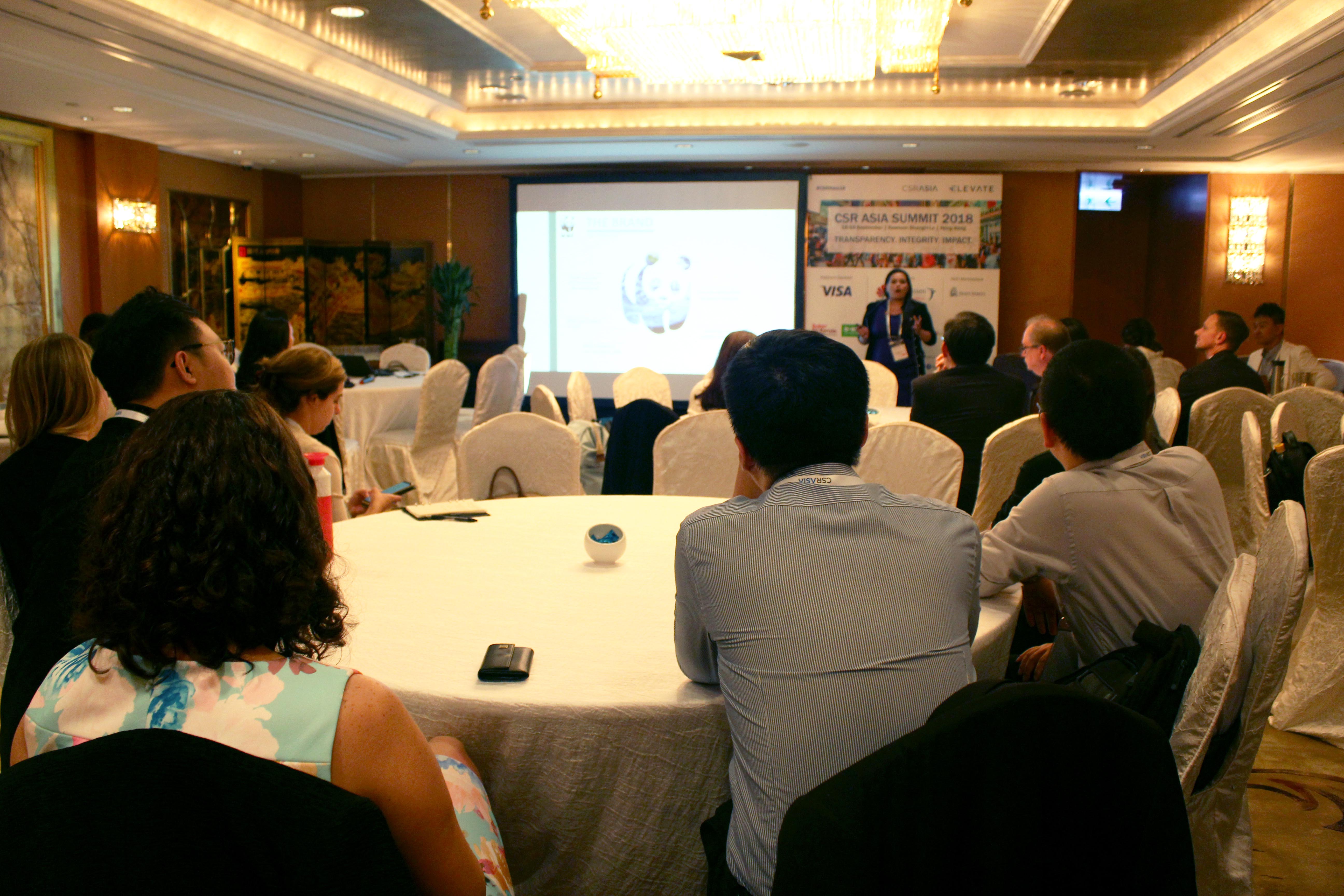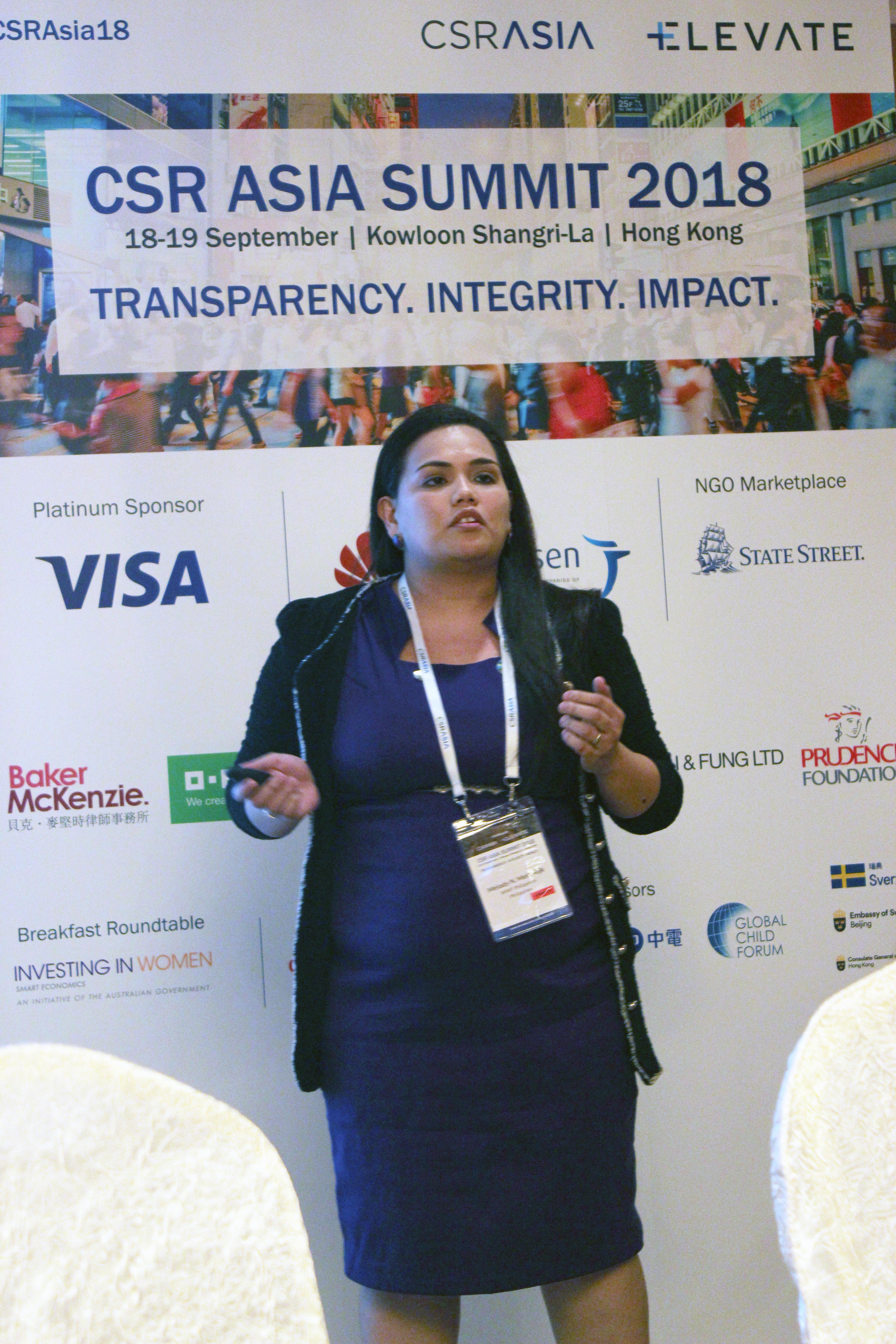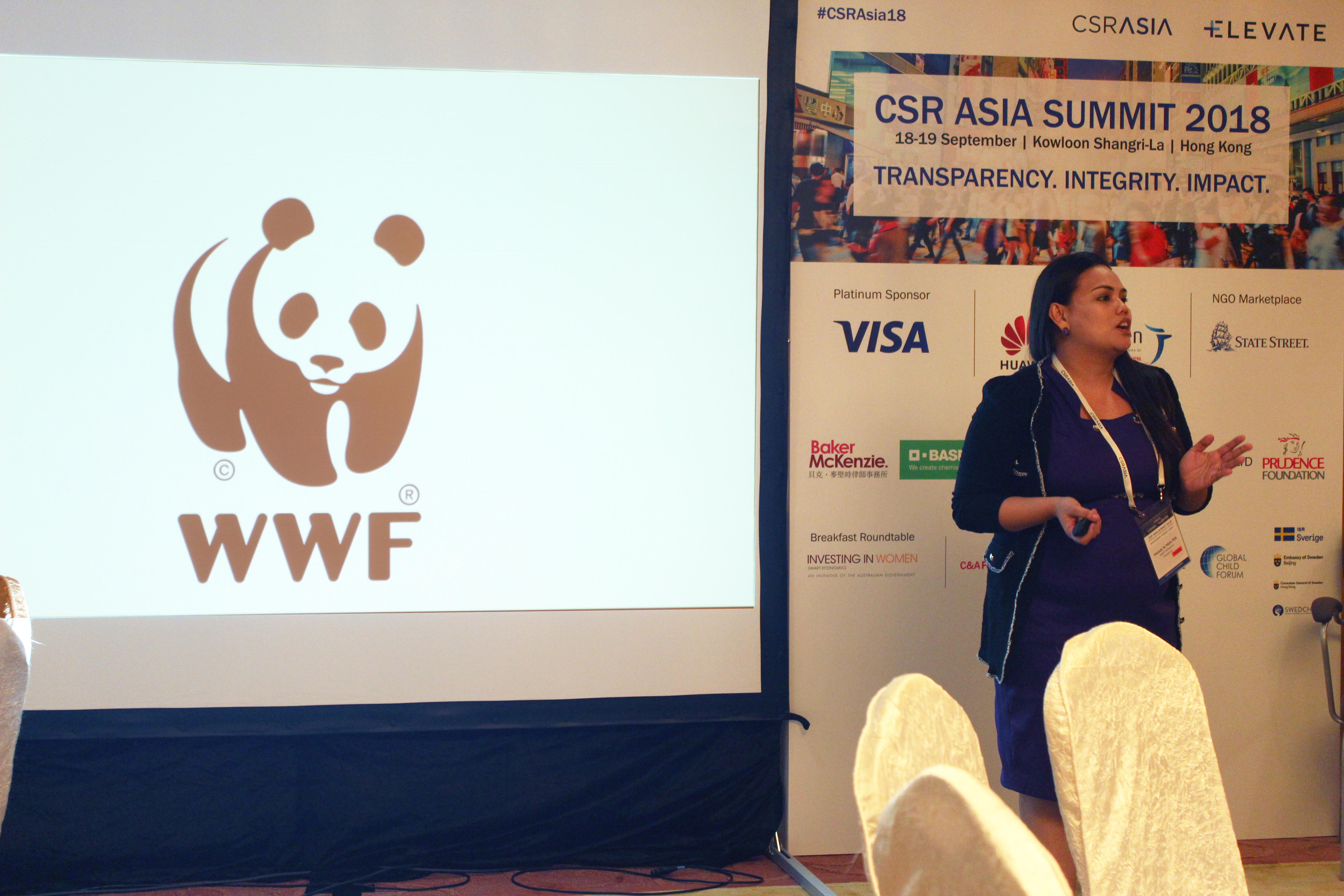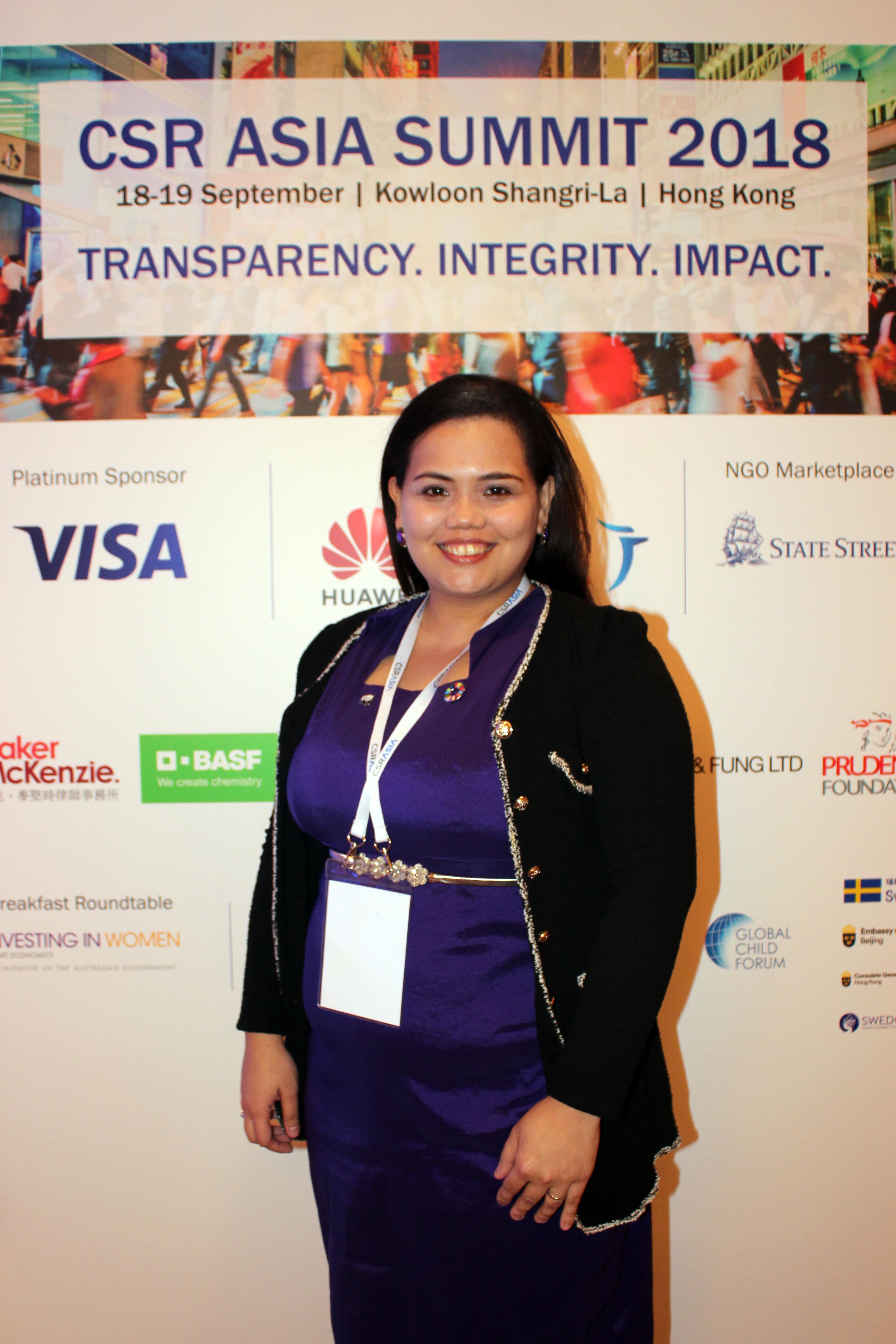Transparency, Integrity, Impact: The Sustainable Diner Project at CSR Asia Summit 2018
October 2018

Melody Melo-Rijk, Project Manager of Sustainable Consumption and Production in the Philippines, speaks to a crowd made up of representatives from corporates, NGOs, and the government from over 23 countries. © Alexa Jeanne Lasch / WWF-Philippines
Last September 18 and 19, 2018, CSR Asia, an ELEVATE company, successfully conducted the 12th consecutive run of the CSR Asia Summit 2018, held at Kowloon Shangri-La, Hong Kong. The theme of the 2018 conference was the concepts of Transparency, Integrity, Impact, which are considered as the foundations of high performing, responsible organizations. With representation from 23 countries, 20 breakout sessions, and 80 speakers, more than 500 regional practitioners and thought leaders were gathered to develop sustainability strategies among the private sector, promote transparency and trust through disruptive technologies and increase competitive advantage.

The Sustainable Diner project was invited to be a part of the Responsible Innovation and Consumer Trends in the Value Chain session, where data points on consumer habits, patterns, and perspectives on sustainable consumption and production were shared. © Alexa Jeanne Lasch / WWF-Philippines
The Sustainable Diner project of the World Wide Fund for Nature (WWF) Philippines was invited to speak at the Responsible Innovation and Consumer Trends in the Food Value Chain breakout session. The breakout session was developed to acknowledge that the way that we grow, transform, and consume food is closely linked to many of today’s sustainability challenges. There is a growing number of issues that are closely linked to food security and agriculture--from climate change to biodiversity loss to human health impacts. Melody Melo-Rijk, WWF’s Project Manager for Sustainable Consumption and Production in the Philippines, was invited to talk about consumer expectations on sustainability and how the market is responding to these expectations, based on a baseline consumer study in the Philippines conducted by The Nielsen Company for The Sustainable Diner project.
“For Filipino diners, we did a baseline survey on how they see or perceive sustainability. Does it resonate with them? What are their consumption patterns and basically, how do they practice sustainability? We did this kind of market research because we want to know the proper channels for us to reach out to them, what type of messaging we can make, what type of campaign we can focus on,” says Melo-Rijk. “Sustainability is an up-and-coming term for the market. Sustainability as a concept is not yet that strong in the Philippines but the key terms that are very much familiar with Filipinos include environment-friendly, food waste, and climate change. The issue on food waste has always been something that resonated with the Filipino market because of values instilled in us as children, that wasting food is bad and that wasting food means wasting money.”
Filipinos have always valued taste, ambiance, service, and price whenever they do dine out. More recently, the terms “Instagrammable” or “Instagram-worthy” have also been associated with the success of restaurants and other dining establishments in the country. Given these primary considerations, is sustainability then a top priority for Filipinos who dine out? “We cannot take away the possibility that sustainability can be a consideration, because in the first place, sustainability, especially in dining, has not been properly established yet in the Philippines,” states Melo-Rijk. “We cannot also really say that Filipinos are not into sustainability because when we ask them separately about the different practices that are considered sustainable or are related to sustainable dining, they are actually doing most of them. It’s just that they are not aware that these practices are considered sustainable.”

Melody Melo-Rijk introducing WWF and the WWF Food Practice to the attendees. © Alexa Jeanne Lasch / WWF-Philippines
It is no secret that sustainability in food consumption and production is badly needed in order to ensure food security, not just in the Philippines, but in the entire world. Globally, it has been proven that food production is one of the industries that cause significant environmental degradation. 70% of biodiversity loss and deforestation comes from food production, while 69% of the world’s freshwater is being used to produce food. In terms of species conservation and food security, 93% of the world’s fish stocks are in critical levels. WWF, as a leading conservation and science-based organization, recognizes that changes need to be made in the food sector. “In this world, there are more or less 7 billion people. In 2050, there will be around 9 billion people. How can we support the needs and demands of these people if we don’t change our current food system?”, asks Melo-Rijk. “This is why WWF’s Food Practice is focused on achieving three goals. The first is sustainable production. We want to incorporate sustainability in how agriculture, livestocks, and fisheries are managed so these industries can sustainably provide our needs. Number two is to eliminate waste, mainly focused on food waste but also the other types of waste generated in the process of food production. And the third is sustainable consumption. We need to somehow change how we consume food and how we use our resources.”
Specifically in the Philippines, WWF hopes to contribute to the achievement of these goals through The Sustainable Diner project, a pioneer project on sustainable consumption and production (SCP) focused on transforming the local dining industry. Borne out of opportunities such as a high trend of out-of-home consumption, high consumer spending, and willingness of Filipinos to pay for green products and services, the project works with three major stakeholders: the government, the food service industry, and Filipino diners. With the government, the project is focused on policy-centric interventions, incorporating sustainability in plans for both national and local policies. For the food service industry, the project is tasked to help restaurants and other food establishments in incorporating sustainability practices in their operations through capacity-building activities and consultations. For Filipino diners, the project promotes awareness through online and offline campaigns, educational modules, and events participation.

All smiles for the camera and proudly representing both The Sustainable Diner project and WWF-Philippines! © Alexa Jeanne Lasch / WWF-Philippines
At the end of the day, if we want to make the food industry more sustainable, each key stakeholder needs to do their part in ensuring that the industry is well-equipped to face difficult challenges such as extreme climate change and the continuous rise of global populations. “Sustainability is a responsibility. We have to make sure that each of us has a role to play in order for us to achieve the protection of our natural resources. The food system would require restaurateurs, sustainable food establishments, and sustainable diners to act. Let us be part of the solution, not of the problem, because every plate counts.”
The Sustainable Diner project, under WWF-Philippines’ Sustainable Consumption and Production, is part of the International Climate Initiative (IKI). The Federal Ministry for the Environment, Nature Conservation, and Nuclear Safety (BMU) supports this initiative on the basis of a decision adopted by the German Bundestag.
